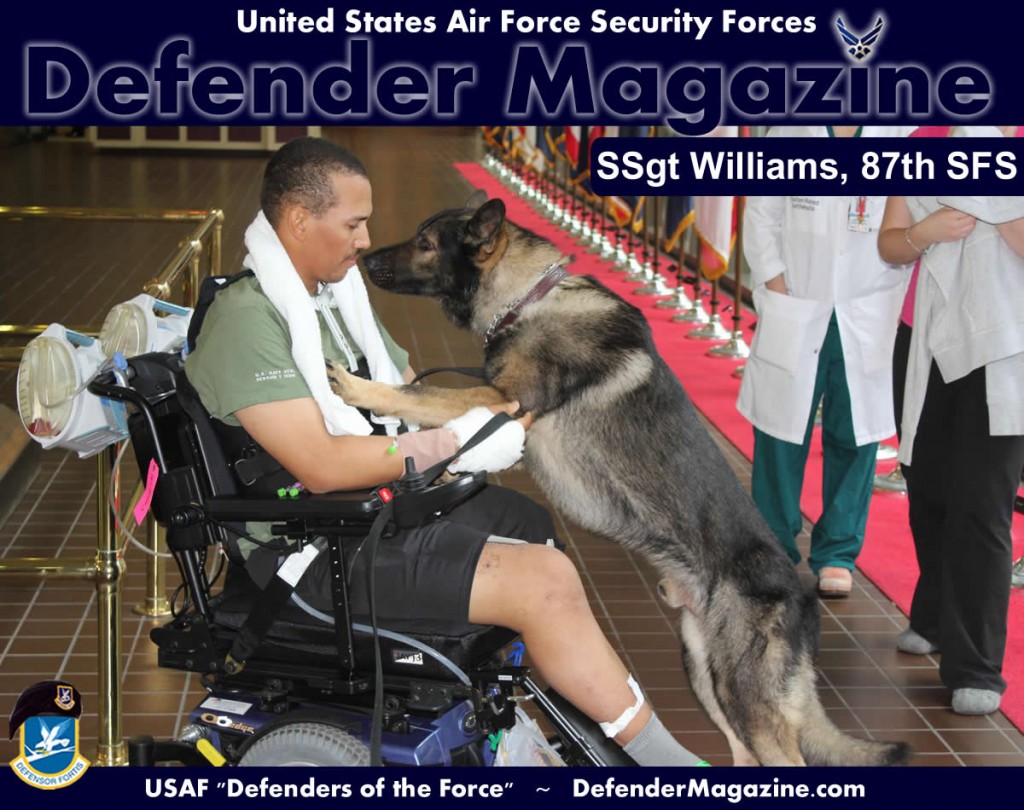The leadership skills Staff Sgt. Brian Williams developed in sports proved even more valuable in his career as an Airman and a military working dog handler. But Williams also brought the desire to win from the football and softball fields to Afghanistan, where his actions led to a Bronze Star and Purple Heart.
April 25, 2012, was a day like any other for the 87th Security Forces Squadron member, who was midway through a six-month deployment with an Army unit in southern Afghanistan. He donned his battle gear, got a firm grip on his partner’s leash and headed to the convoy. Williams’ military working dog, Carly, was ready and willing to follow his confident handler.
His gait, strong from almost 12 years of military training and countless athletic trials, carried a conversation he was usually hesitant to share with words, “I’m ready. Let’s do this.”
Williams and Carly joined their deployed family of Soldiers as they boarded the Mine Resistant Ambush Protected vehicle and strapped themselves in for their mission. After countless training days and months of real-world engagements with the enemy, Williams and members of the 82nd Airborne Division’s Bravo Company were constantly alerted to anything amiss. A buckle, a strap or anything out of place could result in loss of life. Williams’ attention to detail became ingrained in his every action.

“Maybe my standards are too high, but from something as simple as saluting an officer when on gate detail to assuming the right batting stance on the softball field, I expect people to get it right. When they don’t, I want to fix it,” the Arizona native said as he looked down with frustration and clenched the arms of his wheelchair a bit tighter. “Right now, I don’t have home-field advantage. I have to fix that, too.”
Once they arrived at their destination, the Soldiers rapidly exited the MRAP and set up a perimeter as the rest of the team – Williams and Carly among them – assumed positions at their sides. As if at the snap of a football, the offensive line made a singular movement forward across the hard-packed earth. Carly and Williams took point and sought out the defensive weaknesses of Team Taliban. The two cleared a safe path to the goal line, a compound reported to be a homemade explosive laboratory and distribution facility.
Williams, used to being without home-field advantage, didn’t hesitate – just as in 2011 when he walked onto the 87th SFS softball team after the season had started.
“It’s hard to join a sports team when you move to a new base. Most coaches already have their team picked out so you don’t get much playing time or attention,” said Master Sgt. Rodney Dove, the 87th SFS softball coach. “Brian jumped right in and gave everything he had each and every game.”
The handler applied that same mentality as the assault team reached its destination and prepared to clear the compound in the Maiwand District of southern Afghanistan. Williams, not an inherent part of the Soldiers’ team and far from his home station at Joint Base McGuire-Dix-Lakehurst, N.J., adapted to bravo company and their Soldiers’ way of life on yet another “away” field. In typical “Williams fashion,” he set his sights on the win.
“The moment I knew Brian wanted to win more than anything was when there was a play at home plate, and Brian dove over the catcher to touch the plate with the tips of his fingers,” Dove recalled. “A few inches in the other direction, and the outcome would have been entirely different.
“He got the go-ahead run in an extra-inning game,” Dove said. “It’s not easy to find the player who is willing to slide in today’s game, with the exception of a select few, let alone head-first.”
Williams’ desire to play and win earned him a starting spot on the 87th SFS softball and football teams. That same assuredness kept the Soldiers safe behind him as he and Carly moved forward to the target compound.
The MWD team entered a two-story building upon a request from the explosive ordnance team. The sun was up, the day was warm, and the building was vacant. An Afghan soldier acted as interpreter and called on behalf of Williams to anyone who might be hiding in the building, “I am going to release my dog!” Carly, anxious to be off-leash, bounded through the doorway. Williams, one of the few times he didn’t mind following, entered second. The two cleared the first floor and, on command, Carly hit the stairs as if to say, “Let’s do this.” Then, on what former Air Mobility Command Commander Gen. Ray Johns called “the worst moment of the worst day,” Williams gave his partner the head start.

Carly’s continued search of the second floor piqued Williams’ alertness to another level. The MWD handler said he carefully began the ascent up the stairs as the thought, “He may have hit on a scent,” was forming in his mind.
“All of a sudden, there was an explosion, and I was flying backward through the air,” Williams said.
That pivotal moment led to a transcendence of activity – most of which Williams said is more of an understanding of what happened than actual detailed memories. He looked around for a place to take cover, noticed the injury to the leg, needing to call for help. Soldiers surrounded him, dragged him by the collar, their faces close, their words assuring him as hands frantically applied immediate combat life-saving care, followed by running feet transporting him to the helicopter, with new faces, a new team.
From there, he arrived at another playing field as he was medically evacuated to Kandahar Air Field’s Kandahar Regional Military Hospital, the premier trauma care center in Afghanistan, then to Bagram Air Field in central Afghanistan before heading to Landstuhl Regional Medical Center in Germany. Each stop incurred more surgeries, more battles; so many games with no time to rest. “Gotta win,” and in a lifetime wrapped into four days, Williams returned to U.S. soil and his loved ones’ waiting arms.
The six-time deployer sustained, among other wounds, injuries to all four limbs including the loss of his left leg above the knee. He landed at Joint Base Andrews, Md., April 29, 2012, aboard a Mississippi Air National Guard C-17A Globemaster III named “The Spirit of the Purple Heart.” His family and girlfriend, in addition to 87th Air Base Wing leaders, traveled to Maryland in a show of solidarity and support to their wounded warrior.
Since his return, Williams’ months have been filled with numerous surgeries, physical therapy and rehabilitation. He’s been reunited with family and friends, and shared several poignant visits with Carly since that fateful day.
Williams still resides at the Walter Reed National Military Medical Center in Bethesda, Md., where, in addition to ongoing treatment and therapy, he faces several more surgeries and medical procedures.
Johns presented Williams with a Purple Heart, the Air Force Combat Action Medal and a Bronze Star Medal in September. Dove’s words of Williams’ softball prowess, “A few inches in the other direction and the outcome would have been entirely different,” resounded in Johns’ recounting of the IED explosion to a theater filled with home-station supporters:
“If Brian had been two to three inches to his left, he wouldn’t be here today. He has gone through a lot of days of anguish, but he is a person with a lot of attitude. He is learning to survive and thrive in a new way,” Johns told attendees before turning back to the guest of honor. “At the end of the day, through this most terrible day in Afghanistan, I see a lot of wonderful things happening: the love of family, the love of your Air Force family, the love of a girlfriend … and I see such strong ethics in you.”
Williams wheeled himself to center stage at the medal presentation, raised his fists in the air and shouted, “Finally! Brian Williams has come back!” to the more-than 500 people filling the standing-room-only theater.
By Master Sgt. Denise Johnson, Joint Base McGuire-Dix-Lakehurst Public Affairs
January 14, 2013